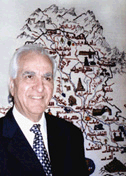River Tourism:
Can Iraq benefit from Europe's experience?
"Some countries, particularly in Europe, utilized their rivers and lakes in the best possible manner, and provided various forms of entertainment for their people on the river banks. The river Seine, which flows through Paris, the river Reine and Main which flows through many German cities and the Danube which flows through many European countries, are excellent examples of areas where river tourism has been developed. It is also an important feature on smaller rivers throughout Europe.
Allah bestowed on us mere human beings a multiplicity of uncountable graces as he says: "But if you count the favours of Allah, never will ye be able to number them".
Among those graces are the life-giving waters of rivers that flow for thousands of miles. Life has always been inextricably linked to water. Allah says: "We made from water every living thing". Water is grace from God: "Say if your water was to sink away, who then can supply you with flowing 'spring' water?"
So what use have people made of rivers?
I am not going to delve into how river water has been utilized in irrigation, agriculture, fishing or by birds and animals that make their homes on the river. Nor will I describe how human beings depend on water for their survival: drinking, washing and cleaning. This article will focus on the use of water for leisure activities and enjoyment as well as its contribution to a thriving economy.
Some countries, particularly in Europe, utilized their rivers and lakes in the best possible manner, and provided various forms of entertainment for their people on the river banks. The river Seine, which flows through Paris, the river Reine and Main which flows through many German cities and the Danube which flows through many European countries, are excellent examples of areas where river tourism has been developed. It is also an important feature on smaller rivers throughout Europe.
The Europeans have always attached paramount importance to protecting their rivers, as they are the means for transporting goods and people between cities and neighbouring countries. Attention has to be paid to the depth of water throughout the year. Most important cities for both residence and trade were established and are still growing on the banks of rivers. Ferries have been developed during recent decades into luxurious tourist vessels, touring cities, particularly in summer time. River sports have also flourished with each sport having its specific boats, equipment and races for both professionals and amateurs.
In some areas there are as many boats as cars. Along popular riverbanks there are in fact more pleasure boats than cars. Boat owners who do not live in a prime location on the river bank use marinas to berth their vessels. It is possible to live on luxurious boats which can be referred to as 'floating houses'.
There are no limits to the care paid by European countries to their rivers. For instance, the municipality of Paris recently brought thousands of tons of golden sand to the banks of the Seine in the heart of the city to encourage both Parisians and tourists to visit these banks instead of going to the coast. Many European countries are emulating this practice.
It is difficult to find words to describe the incredible tourist potential of lakes, rivers and coastal resorts. River tourism it is a lucrative trade which can make a major contribution to the local economy: staff have to be employed to take care of the pleasure boats, parks and recreational facilities along the riverbanks. The rivers, with their dredging equipment, dams, sluices and embankments are also a hive of industrial activity which makes use of the most advanced technological developments.
Tourists, both individuals and tourist groups, easily account for half of the industry which flourishes along the river banks. River tourism is most developed in Europe and its experience could benefit countries such as Iraq, which have a tremendous potential for the development of rivers that have given life to man since time immemorial.
Iraq: the vision and the transformation
Tales were told about life in the valley of the Tigris and Euphrates (Mesopotamia) where poets composed their most eloquent and expressive verses. The Hanging Gardens of Babylon, one of the Seven Wonders of the ancient world, illustrated how people thrived on the riverbanks and how irrigation systems were used in ancient times. That is why Iraq, a densely populated country with abundant agricultural development, was called, the 'black land'. Tragically this magnificent infrastructure was damaged and destroyed by invasions, negligence and ignorance.During the past thirty years, rivers in Iraq were used exclusively by the power elite and its entourage. Even the parks and tourist sites on the river banks were ravaged, as were and coffee shops known for Masgouf (fish grilled on a wood fire) in Abu Nawas Street, the famous boulevard along the Tigris. There are a few archaic coffee shops and parks on the banks of some of rivers in Iraq, but most have been left to face their fate, the victims of neglect and a total disregard for conservation. No attention has been paid to the depth of the rivers or water flows. Building works near the rivers are random with no aesthetic consideration and, despite the abundant water supply; there are few trees or orchards along the river banks.
To help rectify this situation a ten-year plan could be implemented with not less than 5% of the state budget allocated to the conservation and development of rivers and water ways to generate employment for up to a million people.
The plan could make provision for the construction of locks and sluices that control water levels on both large and small rivers. This is necessary to maintain the minimum level of water required for each part of the river. The probability of flooding also has to be investigated and outlets for excess water to be directed to reservoirs provided.
We should not forget that the primary function of locks is to maintain a suitable water level for pleasure and commercial craft as is the case on the Thames. (See Page 8-14)
Locks and sluices form natural islands in rivers enhancing their natural beauty. They also have other uses, such as bridges. Dams and locks can augment river tourism and the development of alluvial areas along the river banks, as sluice gates and collect unsightly river waster such as plastic boxes, cans etc. They can also be used to place an automatically operated grid to remove litter from the water to the river bank. (I had suggested this idea in a meeting at Staines after the flood that had affected my house this year).
As for pleasure and recreation uses of the river, there should be encouragement of importing private cruises and boats, with incentives for the private sector to participate in importing equipment and providing maintenance for the boats. There is also a need to establish tourist villages, restaurants and parks.
All this should be implemented with the uttermost care for the environment, such as conservation of fish resources through maintaining water purity and preventing the oil pollution from boats and to carry out an awareness campaign in this regard. Birds living in the rivers and lakes should also be protected.
Iraq has tremendous potential for investment by the private sector in river tourism. Pleasure boats and commercial craft can be imported or constructed in the country itself. Tourist villages can be developed along the river banks, also an ideal location for restaurants, parks and clubs for river sports such as fishing. Wildlife, especially endangered species, must be protected and the purity of the water restored and maintained. Suitable environmental protection laws will have to be passed and enforced.
Above all Islamic social values and morals must be upheld so Muslims, as well as foreigners, can enjoy Iraq's natural beauty without embarrassment.
It is ironical that the cold countries of the north pay the utmost attention to their rivers even though the summer season is short and the winter is long. In Iraq the summers are long and winters short - even the winters are moderate! But these gifts of nature have been forgotten.
River tourism may seem like a fata mogana in today's Iraq. But without hope nothing is achieved. Aren't we planning to make Iraq an international tourist destination?
May Allah guide us to the best of deeds.
A S Shakiry
|

